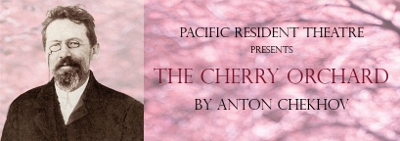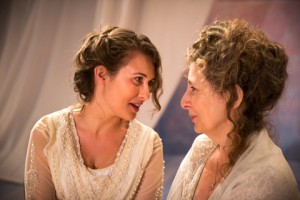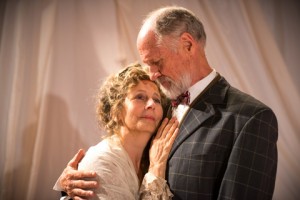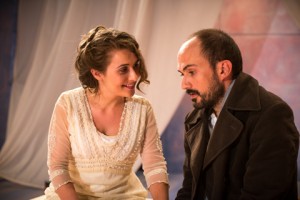SOUR CHERRIES
It’s been 110 years since The Cherry Orchard premiered. While Chekhov insisted that his play about the fall of Russian aristocracy—and the fallout from the abolition of serfdom—was a comedy, director Constantin Stanislavski saw the now oft-produced, 14-character, 4-act script as a tragedy. Clearly, they are both correct.
The tragicomedy centers on Ranevskaya, a matriarch and landowner of a magnificent estate with its fabled cherry orchard, and Lopakhin, a merchant and the grandson of serfs once owned by the Ranevskaya family. Penurious but generous, Ranevskaya has returned from a five-year stay in Paris as her family home is to be auctioned off for mortgage money. Both are fleeing emotional memories: Lopakhin had a brutal peasant upbringing, and Ranevskaya mourns the death of her husband, son, and all that her previous life entailed, including Russia’s caste system.
The tragedy is that both are victims of their changing world: Lopakhin lacks self-confidence as he morphs from proletariat to middle-class bourgeoisie; and Ranevskaya is seemingly beyond control and understanding of her plight. The play’s comedy resides in typically wacky Chekhovian characters and the fact that the former landowners peacefully accept their situation—even after Lopakhin has offered the family a way to save their land by parsing the estate into cottages (by definition, you would be hard-pressed to find such an outcome in a so-called tragedy).
The Cherry Orchard is about how hard it can be to accept changes. It’s also about how resilient people can be in the face of change. And, although a string of melancholy threads its way throughout the play, its characters are rife with placid humor. It offers an optimistic view of civilization, which is precisely what a comedy does. We’re left with the reassuring notion that everything really is going to be all right.
While scholars will no doubt endlessly conjecture on the nature of Chekhov’s genius, he was certainly able to accept life as process and change without succumbing to sentimentality. The widely reported quarrel between Stanislavski and Chekhov exemplifies the ambiguity of such critical terms as “comedy” and “tragedy,” “optimism” and “pessimism.”
The play’s dual nature, as with some of Shakespeare’s “problem plays,” presents a difficult balancing act for a director. There is no reason why the script needs updating, and presenting a straightforward version in turn-of-the-century style does not render the 1903 work old-fashioned. But without subtext creating a reason for a revival (our current foreclosure zeitgeist and disappearance of the middle-class isn’t enough), the array of expository dialogue and parade of characters with Russian names difficult to remember can be a deadly affair.
I simply could not discern what Chekhov’s people actually want in director Dana Jackson’s superficial production at Pacific Resident Theatre. Her actors vacillate between lovely and off-puttingly peculiar, but most flounder for any kind of meaning behind their roles. Unquestionably well-cast, the ensemble members appear left to their own devices to discover nuance, hidden agenda, and how to relate to one another. A few are spot-on: The lovely Kelsey Ritter as Ranevskaya’s daughter Anya embodies understanding, love, and optimism; the bearded, burly, and bemused Aramazd Stephanian seems to have stepped out of a tintype as a neighboring landowner equally hit with hard times, Boris Borisovich Simeonov-Pishchik (do you see what I mean about these names?); and Marilyn Fox, although she too often veers towards the dolorous as Ranevskaya, is a model of stalwart vulnerability.
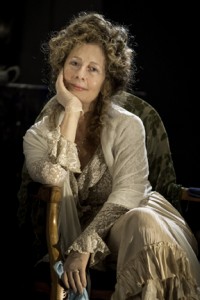 This version isn’t disastrous, as was the deplorable 2006 Sean Mathias rendition with Annette Bening and Alfred Molina at the Mark Taper Forum, but it was disappointing, especially given the roster of talent, including Bruce French, memorable for his star turn in PRT’s The Browning Version. Without a point-of-view, this staging ends up rather dull, spineless, and contrived—problems which seem to curse productions of Chekhov with regularity.
This version isn’t disastrous, as was the deplorable 2006 Sean Mathias rendition with Annette Bening and Alfred Molina at the Mark Taper Forum, but it was disappointing, especially given the roster of talent, including Bruce French, memorable for his star turn in PRT’s The Browning Version. Without a point-of-view, this staging ends up rather dull, spineless, and contrived—problems which seem to curse productions of Chekhov with regularity.
Ironically, it was Stanislavski who found the key to Chekhov’s elusive art: In 1907, he described Chekhov, who died the same year The Cherry Orchard premiered in 1904, as a realistic optimist: “He painted a cheerful, always lively and confident, beautiful picture of Russian life. It was only that he looked at the present without falsifying it. He was not afraid of the truth.” The only consistently truthful and confident element of PRT’s production resides in Audrey Eisner’s sumptuously detailed and textured costume design. But Jackson’s vision is weak and the acting mixed, too often ringing false. Sadly, we experience neither the tragedy nor the comedy.
photos by Vitor Martins
The Cherry Orchard
produced by Rita Obermeyer, Valerie Havey and Sara Newman-Martins
Pacific Resident Theatre
703 Venice Blvd. in Venice
Tues – Sat at 8; Sun at 3
ends on September 21, 2014
EXTENDED to November 2, 2014
for tickets, call 310.822.8392 or visit PRT
